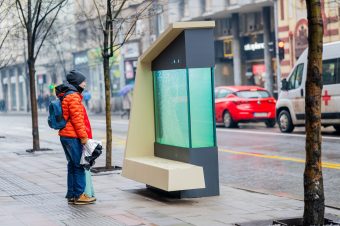
The urban photo bioreactor called LIQUID 3, the first of its kind in Serbia, is an innovative biotechnological solution for combating air pollution in urban areas. The project was initiated and designed by the Institute for Multidisciplinary Research of the University of Belgrade and aims to reduce the emission of carbon dioxide (CO2) in places where the concentrations of this gas are the highest, including the capital city.
LIQUID 3 uses algae in a 600-litre aquarium, which, through photosynthesis, bind CO2 and produce oxygen.
The first LIQUID 3 was installed last year in front of the building that houses the Municipality of Stari Grad, with the second one installed in Terazije, according to the Belgrade government’s website.
In addition to its environmental role, the photo-bioreactor is also designed as a bench with chargers for mobile phones and a solar panel that enables night lighting.
More:
- WHY DON’T SOLAR PANELS WORK AS WELL IN HEATWAVES?
- SOLAREDGE FROM THE POINT OF VIEW OF THE INSTALLER
- FARMLAND – HOME TO SOLAR PANELS AND CROPS
Microalgae have a wide range of applications in Serbia, including wastewater treatment, biomass and biofuel production, but also as compost for green areas. What is so significant is the efficiency of microalgae in binding CO2, which can be up to 50 times higher than that of trees.
The LIQUID 3 project will not replace forests but will complement urban greenery where there is no space for planting trees.
This invention was recognized as one of the 11 best climate-smart solutions under the auspices of the Local Development Resistant to Climate Change project, implemented by UNDP in cooperation with the Ministry of Environmental Protection, with the support of the Global Environment Facility (GEF).
The LIQUID 3 initiative drew attention beyond the borders of Serbia, with over 10 million views on social networks.
Energy portal



